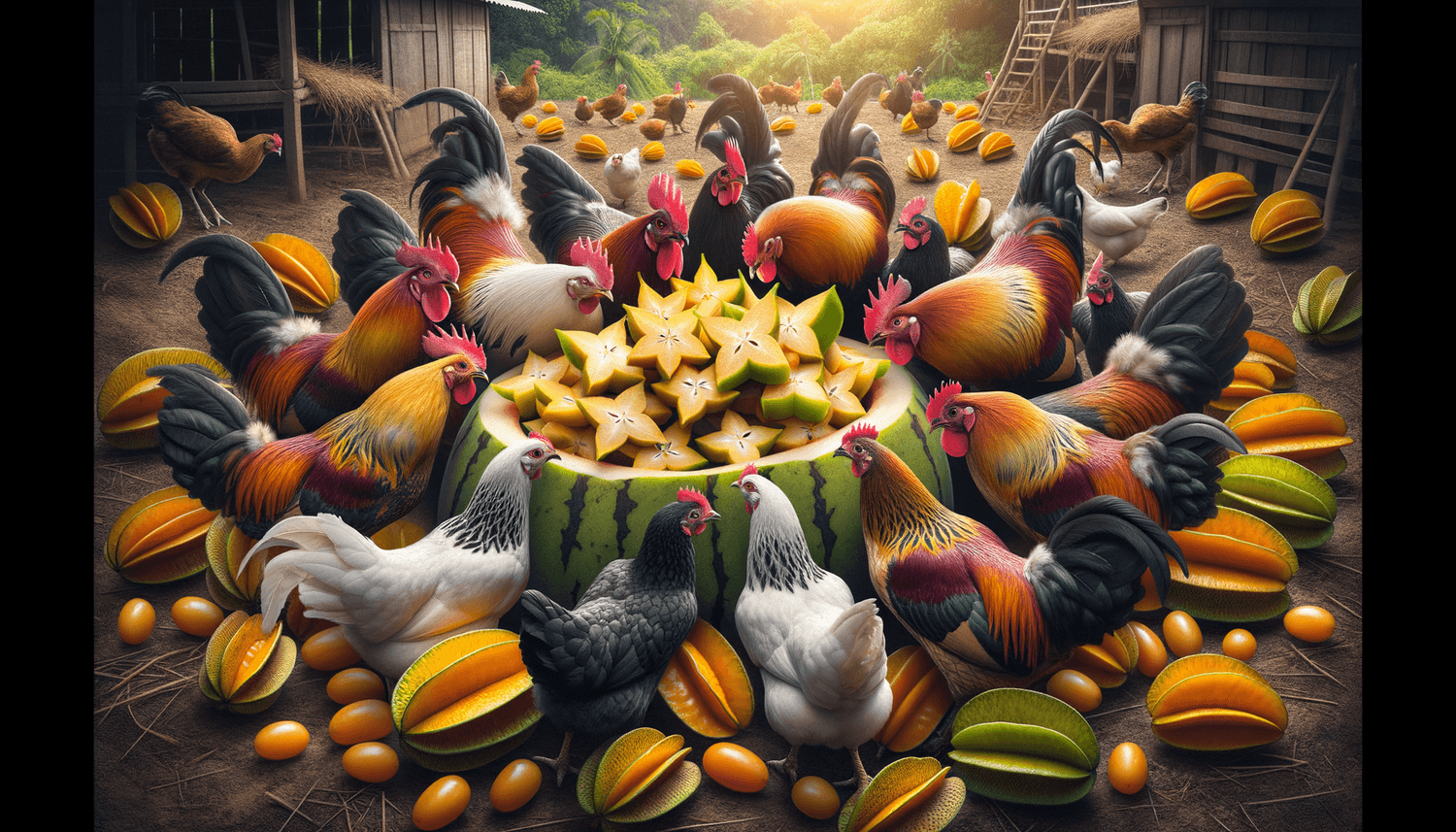Cluck cluck, fellow backyard chicken enthusiasts! Are you ready for some juicy poultry gossip? We’re talking about our feathery friends and their potential pecking pleasure: star fruit! In this fun and informative blog post, we’ll explore whether chickens can eat star fruit, the importance of a balanced diet, the benefits and/or risks associated with this out-of-this-world treat, its nutritional value, and how to dazzle your chickens with the most cosmic dining experience they’ll ever have (no spacesuits required!). So gather your flock and come along on this stellar journey to chicken-treat nirvana!
Can chickens eat star fruit?
Yes, chickens can safely eat star fruit! This exotic fruit makes a delightful and nutritious treat for your backyard flock. However, it’s important to offer star fruit in moderation and as part of a balanced diet to ensure your chickens remain healthy and happy.
A balanced diet for a healthy flock
Just like us humans, chickens too need a balanced diet to thrive and stay in tip-top shape. Nutrition plays a crucial role in their overall health, growth, and egg production. Their primary source of nutrition should be high-quality chicken feed, specifically formulated to meet their dietary needs.
Ideal chicken feed typically makes up around 80-90% of the diet of your feathery flock, ensuring they receive the essential nutrients, vitamins, and minerals necessary for their well-being. The remaining 10-20% can consist of nutritious treats like fruits and vegetables, which can add variety and excitement to their daily fare, making your chickens happier and more content!
Nutritional value of star fruit for chickens.
Feeding star fruit to chickens can offer them a range of nutritional benefits. One of the primary advantages of star fruit is its high water content, which helps keep your chickens hydrated, especially during hot summer days. Hydration plays a vital role in maintaining a chicken’s energy levels, digestion, and overall health.
Beyond hydration, star fruit is packed with essential vitamins and minerals that can contribute positively to a chicken’s health. It is a rich source of vitamins C and A, both crucial antioxidants that help support your chickens’ immune system. Vitamin A also supports healthy vision, reproduction, and growth in chickens.
Star fruit also contains vital minerals such as potassium and calcium. Potassium helps regulate the chickens’ fluid balance and promotes the proper functioning of their muscles and nerves. Calcium, on the other hand, is essential for strong eggshells and healthy bones. Additionally, star fruit contains dietary fiber, which contributes to healthy digestion in chickens.
Nutrition table of star fruit for chickens.
| Information | Description |
|---|---|
| Nutritional Value | Rich in vitamins C and A, potassium, calcium, and dietary fiber |
| Suggested Serving Size | Small portions, 1-2 star fruit per bird as an occasional treat |
| Safe Feeding Practices | Offer star fruit in moderation, and as a part of a balanced diet |
| Preparation | Wash and slice the star fruit into small, manageable pieces for easy consumption |
| Potential Risks | Overfeeding can lead to an unbalanced diet and possible digestive issues |
| Hydration | High water content helps keep chickens hydrated |
| Digestion | Dietary fiber in star fruit supports healthy digestion |
| Seasonal Availability | Star fruit is usually available during summer and fall |
| Other Benefits | Boosts immune system and promotes overall well-being |
Introducing star fruit to your flock
When you first offer star fruit to your chickens, be prepared for a little hesitation. Chickens can be cautious about trying new foods, and the unique appearance of star fruit might make them apprehensive. To make the transition smoother, consider combining the star fruit with some of their favorite treats. As they become more familiar with it, they’ll likely start enjoying the star fruit all on its own.
Alternating treats for better nutrition
It’s essential to keep your chickens’ diet varied by offering them a mix of fruits, vegetables, and other treats. This ensures they receive a wide array of nutrients, vitamins, and minerals. You can alternate star fruit with other chicken-friendly fruits such as berries, melons, and apples. Remember to avoid feeding your chickens fruits with pits, as they can pose a choking hazard.
A note of caution
While star fruit is generally safe for chickens, there have been some reports of the fruit being toxic to people with kidney issues. This is because star fruit contains oxalates, which can cause problems for those with impaired kidney function. However, chickens are not commonly prone to kidney issues, and feeding star fruit in moderation should pose no risk. As always, it’s essential to monitor your flock after introducing any new food, just to be on the safe side.
In conclusion, star fruit can be a delightful and nutritious treat for your backyard chicken flock. Offering it as a part of a varied and balanced diet will ensure your birds stay healthy, happy, and well-nourished. Enjoy watching your feathered friends chow down on this tropical treat!

















